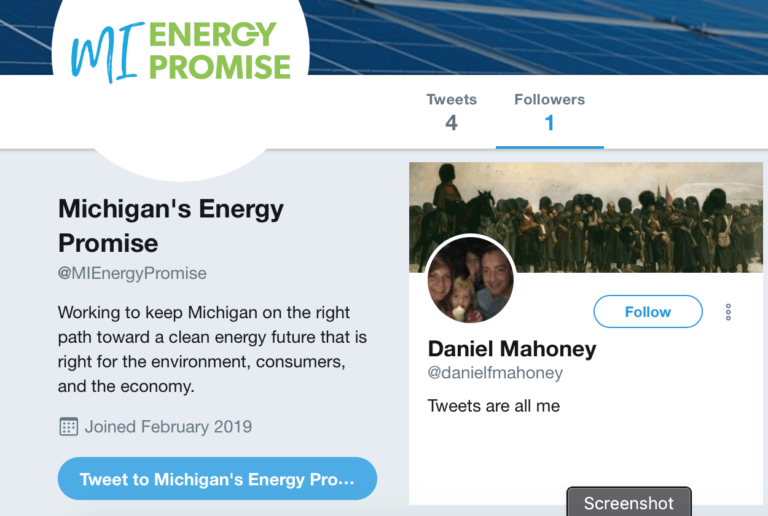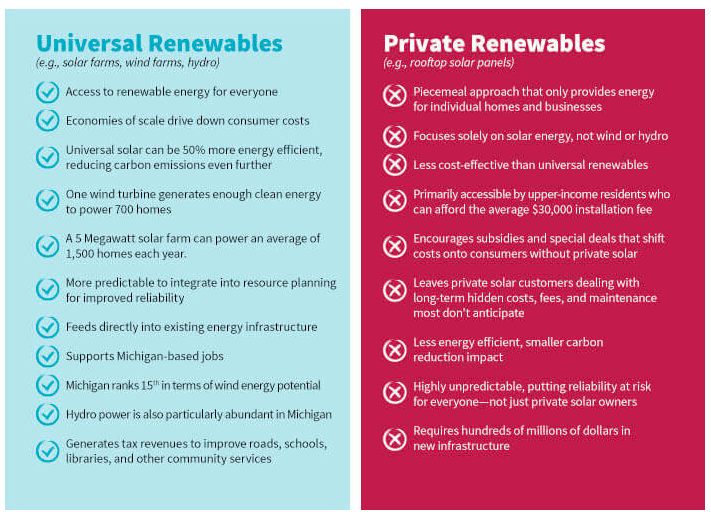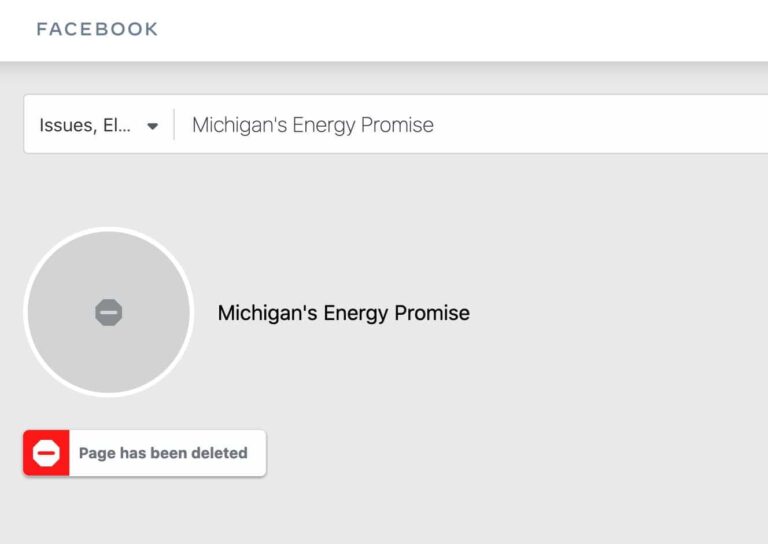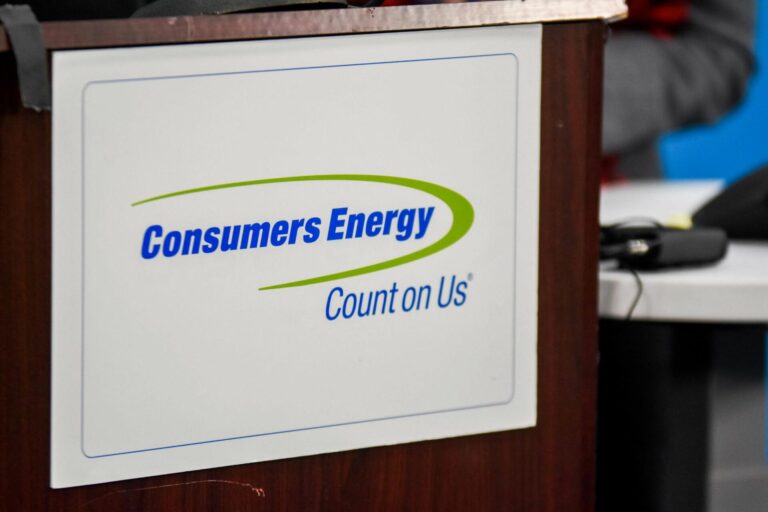Michigan Energy Promise

Michigan Energy Promise is a front group with strong ties to the monopoly utility DTE Energy. It registered with the state on January 2, 2019. According to Midwest Energy News, Michigan Energy Promise supported DTE Energy’s position on net metering and other issues before the Michigan Public Service Commission.

The landing page for Michigan Energy Promise states that it is a “project” of the Alliance For Michigan Power. Alliance For Michigan Power originated from Michigan Energy First.
The Department of Licensing and Regulatory Affairs database shows that the assumed names for Michigan Energy First are Alliance For Michigan Power and Michigan Energy Promise. In other words, all three organizations appear to be coordinated jointly as a single entity.
The group has not disclosed its donors, but it has close ties to DTE Energy.
An archived page of DTE Energy’s www.journeyto80.com website pointed visitors to take action with Alliance For Michigan Power to “stay informed and involved in the energy debates that affect all of us.”
Michigan Energy First’s president is DTE Energy’s Vice President of Corporate and Government Affairs Renze Hoeksema. The treasurer is Theresa Uzenski, a manager of regulatory accounting at DTE Energy. Another board director was Fred Shell, DTE Energy Vice President of Corporate and Government Affairs until he retired in 2016.
DTE Energy spokesperson Peter Ternes told Midwest Energy News that the utility is “part of the Alliance for Michigan Power coalition,” and Hoeksema and Uzenski “serve in an advisory capacity” on the organizations’ boards “to provide information” about issues.

The first Twitter follower for Michigan Energy Promise was DTE Energy’s Daniel Mahoney, a policy strategy and advocacy manager.
According to its 990 tax forms, Michigan Energy First has received over $46 million in contributions since 2014 – including $18 million in 2018.
Organizations listed on Michigan Energy Promise’s “allies” page are mostly churches, chambers of commerce, and non-profits that advocate for communities of color. (The page has since been deleted, but an archived page from February 2020 is available here.) Many of the organizations have either received money from the DTE Energy Foundation in recent years, list the utility as a corporate sponsor on their websites, or include a utility employee as a member of their board.
| Michigan Energy Promise member | Contributions from the DTE Energy Foundation (2013-2018) |
|---|---|
| Detroit Association of Black Organizations (DABO) | $137,500 |
| Arab Community Center for Economic and Social Services | $225,000 |
| Arab American and Chaldean Council | $308,000 |
| Fellowship Chapel – Affiliated with United Church of Christ. Amandla Community Development Corporation used to receive money for the Chapel’s building projects. | $200,000 |
| Detroit Cristo Rey High School | $59,000 |
| Latin Americans for Social and Economic Development | $180,000 |
| Midwest Independent Retailers Association (Associated Food & Petroleum Dealers is a nonprofit trade association and has the same address as the Midwest Independent Retailers Association) | $20,000 |
| Black Family Development | $57,500 |
| New Faith Temple – Community Development Corporation | $30,000 |
| Church of God in Christ | $30,000 |
| Church of God in Christ Public Policy Institute for Justice (same address for New St. Paul Tabernacle Church of God in Christ) | $20,000 |
| Archived page of Michigan Energy Promise members. | DTE Energy Foundation IRS 990s for 2018, 2017, 2016, 2015, 2014, 2013. |
Michigan Energy Promise grant documents reveal that the organization exists to “educate and engage local communities and our leaders in Lansing on smart policy solutions.”
It intended to perform “person-to-person engagement” through canvassing, prayer breakfasts, block parties, and community events.
The organization also wanted to use media initiatives, such as earned media, to reach its “targeted audience.” Former Michigan Public Service Commissioners John Quackenbush, Monica Martinez, and Steven Transeth, along with Bishop W.L. Starghill, Jr. of the Michigan Democratic Black Caucus, authored pieces that defended DTE Energy’s energy policy proposals last year. Starghill Jr.’s opinion piece mentions that he is a member of Michigan Energy Promise.
One of Michigan Energy Promise’s first Facebook posts promoted Quackenbush’s Detroit News’ opinion piece that attacked net metering and advocated for regulators to continue their pursuit of the “inflow/outflow model.” Critiques of the inflow/outflow model say it does not adequately compensate rooftop solar customers for the power they send back to the grid.
Michigan Energy Promise’s Facebook page and Twitter accounts also promoted Martinez’s Lansing State Journal opinion piece, which discussed the state’s solar policies. Martinez wrote that all customers need to pay a “fair and equitable market price for the solar from their neighbors.” Martinez has written similar opinion articles over the years with the same talking points. She is the co-founder of Hispanics in Energy, which has received funding from the investor-owned utility trade association the Edison Electric Institute (EEI).
Multiple studies have shown that solar customers actually provide more benefits than costs to all electric customers, and a report from the Lawrence Berkeley National Lab offers the latest evidence that the utilities’ cost shift argument is, for the most part, a self-serving myth.
The Michigan Energy Promise grant documents also reveal that the group targeted low-income customers, non-English speaking customers, people in public education and safety, people with disabilities, seniors, and union members in its campaign.
Michigan Energy Promise’s webpages are filled with pro-utility industry messages that criticize rooftop solar and even the Public Utility Regulatory Policies Act (PURPA), which is a law that encourages competition by requiring utilities to purchase power from independent power providers.
Some of Michigan Energy Promise’s talking points appear to be straight from the playbook that a PR firm, Maslansky + Partners, created for EEI. One of Maslansky + Partners’ recommendations to the industry was to rebrand rooftop solar as “private solar” and call utility-scale solar “universal solar.”

Self-employed political consultant Graham Davis’ LinkedIn profile shows that he worked for the Alliance For Michigan “project” in 2013 alongside DTE Energy and DDC Advocacy when he was the director of digital media at Truscott Rossman. The second Twitter follower of Michigan Energy Promise was DDC Advocacy Senior Vice President William Bertles.
DDC Advocacy is a Washington D.C.-based public relations firm. It won a silver Pollie in the Internet category in 2014 for its work on behalf of DTE Energy on the Alliance for Michigan Power website. According to the American Association of Political Consultants website, the Pollie Awards are “the most prized and sought-after awards in the political communications and public affairs industries.”
The metadata in the Michigan Energy Promise grant documents reveals that the author was DDC Advocacy employee Kevin Wise.
Truscott Rossman is a Michigan-based lobbying and public relations firm. The CEO of the firm, John Truscott, managed the public relations for the 2012 DTE Energy and Consumers Energy-funded campaign to fight a 25% by 2025 renewable portfolio standard ballot proposal. Additionally, Truscott Rossman’s website boasts of its success at its ability to work with the utilities to get energy legislation passed in 2016.
Ron Fournier, president of Truscott Rossman, is the spokesperson for Michigan Energy Promise. He is also the former editor of Crain’s Detroit Business and former senior political columnist at the conservative National Journal magazine.
Michigan Energy Promise’s Facebook page was deleted at some point in the first half of 2020.




